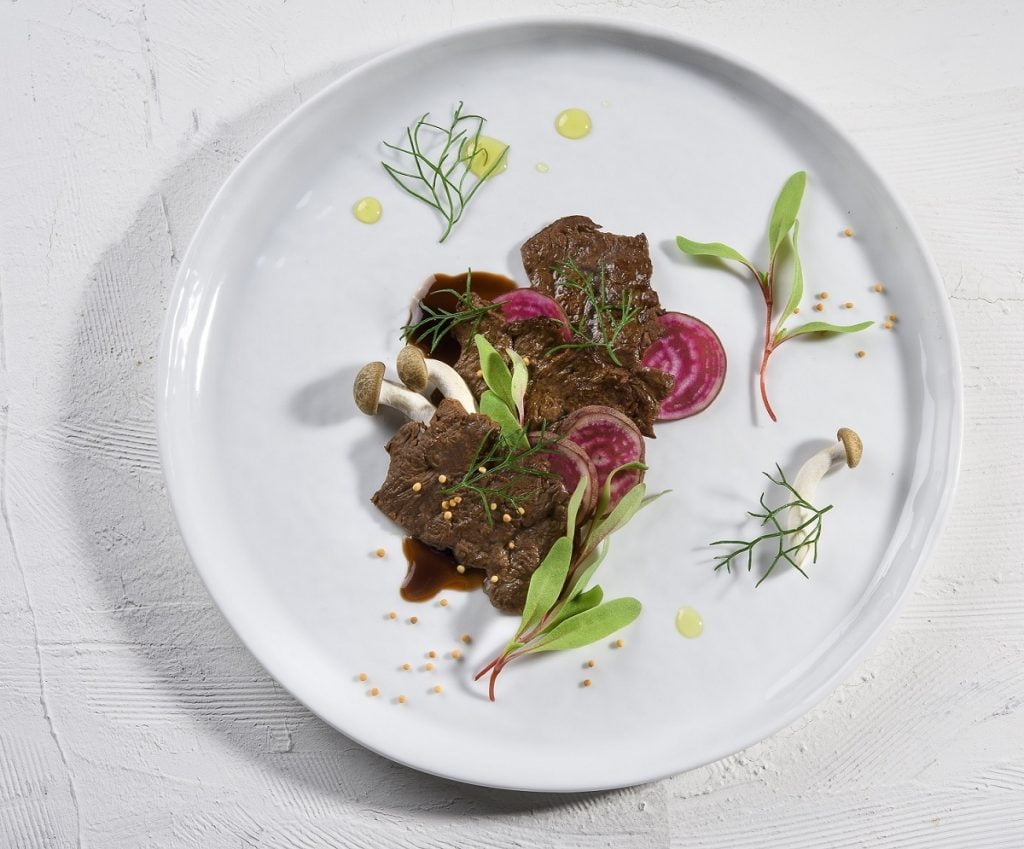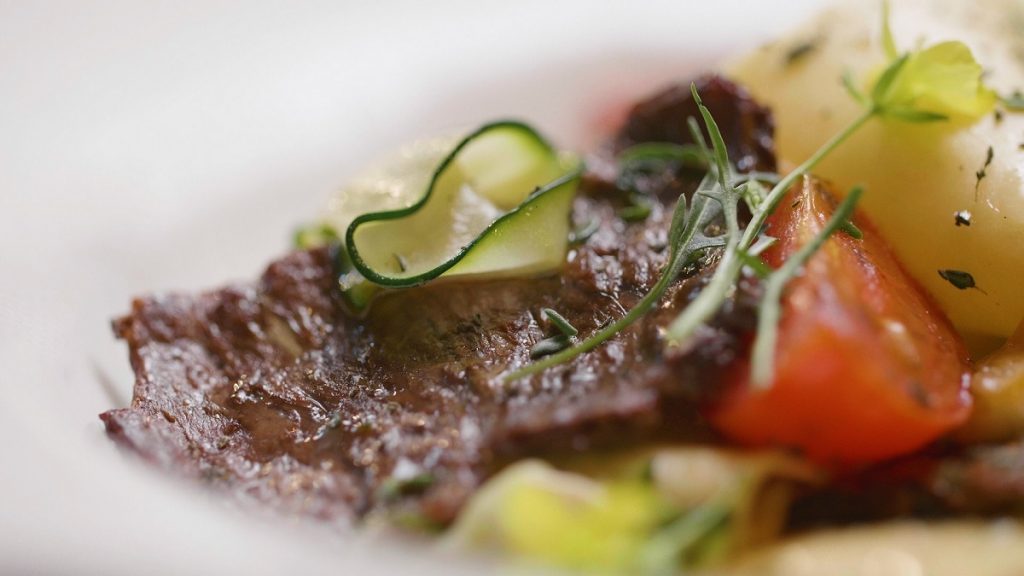Israeli clean meat company Aleph Farms has officially unveiled the first slaughter-free steak grown from animal cells to deliver “the full experience of meat with the appearance, shape, and texture of beef cuts,” the company revealed on Wednesday, essentially announcing what it says is the first prototype of lab-grown steak in the world.
Aleph Farms says its 3D technology enables it to mimic traditional cuts of beef in both structure and texture, but without beef’s huge environmental impact, its heavy resource requirements, or its contribution to climate change.
“We’re shaping the future of the meat industry — literally,” says Aleph Farms co-founder and CEO Didier Toubia. “Making a patty or a sausage from cells cultured outside the animal is challenging enough, imagine how difficult it is to create a whole-muscle steak.
“At Aleph Farms, this is not science fiction. We’ve transformed the vision into reality by growing a steak under controlled conditions,” he added in a statement.
SEE ALSO: The Future of Food? How New Israeli Tech Could Have You Eating Meals Made By A 3D Printer
The milestone achievement didn’t come easy. Aleph Farms, previously Meat-the-Future, was co-founded in 2017 by Israeli food-tech incubator The Kitchen, a part of the Strauss Group, and the Technion-Israel Institute of Technology, alongside Toubia and Professor Shulamit Levenberg, the startups’ chief scientific officer.
Levenberg said earlier this year: “It has been a major hurdle to mimic meat’s many properties, such as texture, shape, juiciness, and flavor. Our use of the four cell types found in conventional cuts of meat, including vascular and connective tissues, is the key to a product that will be closer to the beef that people crave.”
Aleph Farms says one of the barriers has been “getting the various cell types to interact with each other to build a complete tissue structure as they would in the natural environment inside the animal. The challenge is to find the right nutrients and their combination that would allow the multicellular matrix to grow together efficiently, creating a complete structure.”
The company indicated it overcame this obstacle with a bio-engineering platform co-developed with the Technion. Now Aleph Farms says it can make steak grown in a lab “without the need for devoting vast tracts of land, water, feed, and other resources to raise cattle for meat” and with no use of antibiotics.
The startup says it is implementing a combination of six unique technologies that allow it to drop the production costs of the meat, including innovative approaches to an animal-free growth medium to nourish the cells, and bioreactors – the tanks in which the tissue grows.
The startup released a video alongside the announcement showing the lab-grown meat being prepped, cooked, and plated.
“For me, it is a great experience to eat meat that has the look and feel of beef but has been grown without antibiotics and causes no harm to animals or the environment, says Amir Ilan, chef of the restaurant Paris Texas in Ramat Gan, Israel. “Aleph Farms meat has high culinary potential – it can be readily incorporated into top-shelf preparations or served in premium-casual restaurants, trendy cafes, bistros, or other eateries.”
Sign up for our free weekly newsletter
SubscribeAleph Farm’s product is not yet available commercially, “but the technology we developed marks a true breakthrough and a great leap forward in producing a cell-grown steak,” Aleph Farms’ Toubia said.
In 2013, Dutch startup Mosa Meat unveiled the world’s first lab-made hamburger – at a cost of some $330,000 for the meal. The company has since raised over $8 million to bring the product to commercialization.
Clean Meat Ecosystem
Aleph Farms is part of a growing ecosystem of sustainable food and “clean meat” startups in Israel and across the world that are looking to offset the increased consumption of meat as the world population grows. The demand, high production cost of meat and its use of resources is having a detrimental impact on the environment, scientists have warned
Jerusalem-based Future Meat Technologies is also looking to transform global meat production with lab-grown meat. The technology is based on Professor Yaakov Nahmias’ research at The Hebrew University of Jerusalem. Nahmias has noted that Future Meat is the only company that can produce animal fat without harvesting animals and without genetic modification. In May, the company raised $2.2 million in a seed round led by Tyson Ventures, the venture capital arm of Fortune 100 company Tyson Foods, one of the world’s largest food producers.
SEE ALSO: Israeli Startup Jet Eat Looks To Replace Meat With 3D Printed Vegan Steaks
SuperMeat, meanwhile, an Israeli producer of lab-grown poultry extracted from the stem cells of a live chicken, raised over $3 million earlier this year.
And just last month, NoCamels reported on a new startup, Jet Eat, that is developing technology for the 3D printing of vegan meat substitutes based on plant formulations that emulate the appearance, texture, and taste of natural meat. Jet Eat says it has raised funding from angel investors and is currently working on a seed round investment, with an aim to roll out its product by 2020.
Jet Eat was among the winning companies late last month at the 2018 Food Accelerator Network Program competition. The contest is hosted by the European Institute of Innovation & Technology (EIT), a food innovation initiative made up of a consortium of industry players, startups, research centers, and universities from across Europe seeking to create a sustainable and future-proof food sector.
Aleph Farms joined The Rising Food Stars, an exclusive club hosted by EIT of outstanding agrifood startups, in July.
Related posts

Editors’ & Readers’ Choice: 10 Favorite NoCamels Articles

Forward Facing: What Does The Future Hold For Israeli High-Tech?

Impact Innovation: Israeli Startups That Could Shape Our Future





Facebook comments